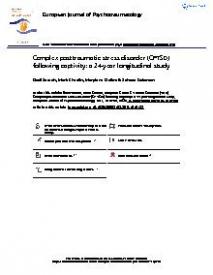Complex posttraumatic stress disorder (CPTSD) following captivity : a 24-year longitudinal study
Background: The World Health Organization(WHO) International Classification of Diseases, 11th version (ICD-11), has proposed a new trauma-related diagnosis of complex posttraumatic stress disorder (CPTSD), separate and distinct from posttraumatic stress disorder (PTSD). However, to date, no study has examined CPTSD over time.
Objectives: This prospective study aimed to examine predictors and outcomes of latent classes of PTSD and CPTSD following war captivity.
Method: A sample of 183 Israeli former prisoners of the 1973 Yom Kippur War (ex-POWs) participated in a 24-year longitudinal study with three waves of measurements (T1: 1991, T2: 2008, and T3: 2015). Participants completed validated self-report measures, and their cognitive performance was assessed using the Montreal Cognitive Assessment (MoCA).
Results: A Latent Class Analysis (LCA) identified three main classes at T2: (1) a small class with low probability to meet PTSD and CPTSD clusters criteria (15.26%); (2) a class high only in PTSD symptoms (42.37%) and (3) a class high only in CPTSD symptoms (42.37%). Importantly, higher levels of psychological suffering in captivity at T1 were associated with higher odds of being in the CPTSD class at T2. In addition, CPTSD at T2 was more strongly associated with low self-rated health, functional impairment, and cognitive performance at T3, compared to the PTSD only class.
Conclusions: Adulthood prolonged trauma of severe interpersonal intensity such as war captivity is related to CPTSD, years after the end of the war. Exposure to psychological suffering in captivity is a risk factor for future endorsement of CPTSD symptoms. CPTSD among ex-POWs is a marker for future dire mental health and functional consequences.
Geachte bezoeker,
De informatie die u nu opvraagt, kan door psychotraumanet niet aan u worden getoond. Dit kan verschillende redenen hebben,
waarvan (bescherming van het) auteursrecht de meeste voorkomende is. Wanneer het mogelijk is om u door te verwijzen naar de bron
van deze informatie, dan ziet u hier onder een link naar die plek.
Als er geen link staat, kunt u contact opnemen met de bibliotheek,
die u verder op weg kan helpen.
Met vriendelijke groet,
Het psychotraumanet-team.
In: European Journal of Psychotraumatology, ISSN 2000-8066 | 10 | 1 | 1616488
https://www.tandfonline.com/doi/pdf/10.1080/20008198.2019.1616488


